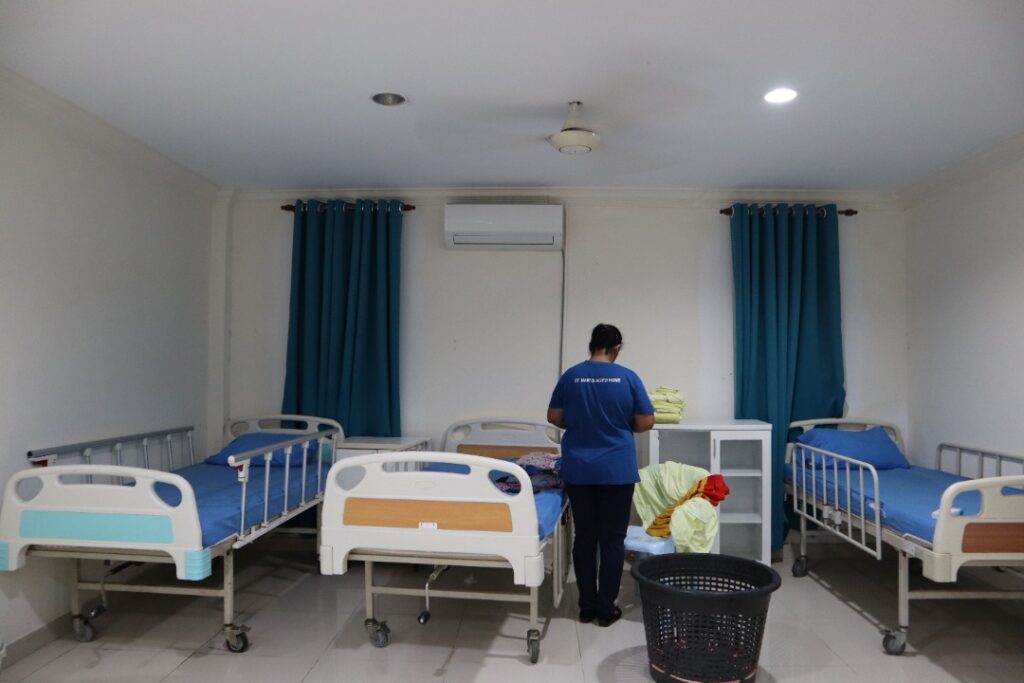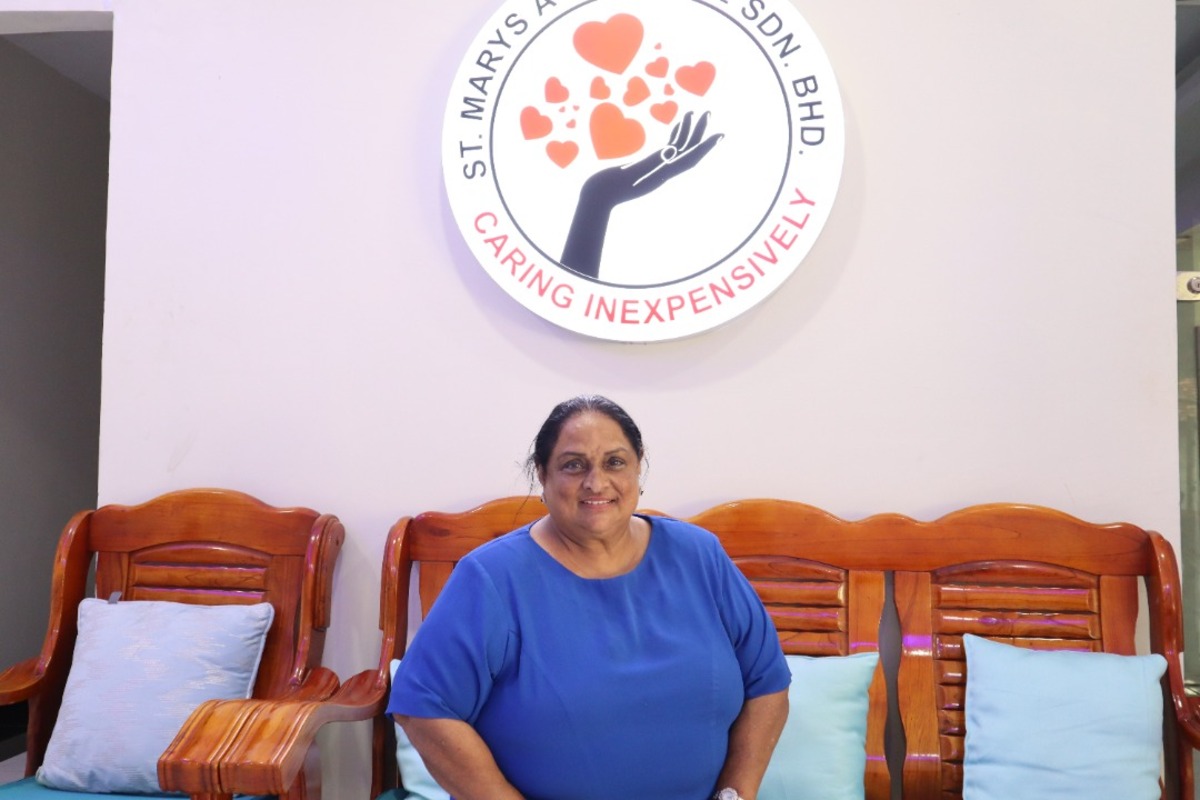KUALA LUMPUR, Nov 4 — Joan Daniel, an 89-year-old resident at St. Mary’s Aged Home in Seputeh here, says she will not be able to vote in the 15th general election.
Sitting comfortably in her wheelchair in the cool shade of the awning, Joan gave a slight shake of her head when CodeBlue asked whether she would be exercising her right to vote in the upcoming elections.
“I can’t go ’cause I can’t. ‘Cause this week, doctor told me not to put down my feet. I’ve got an excuse, unless they come here. That, I don’t know,” Joan said with a wistful smile.
“I see how things are; what my sister says. I depend on my sister. But if I could, then maybe I will go. But I don’t think I can.”
Joan, who had spent five days at the elder care home when CodeBlue visited St. Mary’s last Tuesday, knew that she would no longer be able to continue with her former way of life when she fractured her leg after a fall.
Having been informed of the dangerous nature of her surgery, Joan opted out of the risky procedure, choosing to allow her leg to mend over time.
Behind the buzzing hum of excitement sweeping through the nation ahead of what is touted as the mother of all elections, with an uncertain outcome, 20 senior citizens reside at St Mary’s at Jalan Halimahton in Taman Halimahton – all of whom will not be able to exercise their right to vote in the November 19 national poll as they do not have the means to access their polling stations.
According to Jagit Kour, a certified nurse and the proud owner of the pristine and meticulously run St. Mary’s Aged Home, which she founded in 1985, among the primary hurdles that many elderly Malaysians find almost impossible to surmount is the crowded polling stations, with snaking lines and long waiting times.
Often held in places like primary and secondary schools, the ballot box remains out of reach for seniors who are reliant on their wheelchairs and the aid of family and friends to help them manoeuver through the tight, narrow spaces of these schools, until they arrive at the stairs, which prevents them from going any further.
“They can’t walk, or there is no one to take them there. And then, there are long queues at voting centres; they tire out, and some of them can’t even control their urine for a long time. Then who would change their diapers in the queue?” said Jagit.
“There’s not enough facilities too (at the polling station), and they need a lot of helpers to get them to go to vote. So the elderly votes don’t come because they can’t get out, so they don’t go,” she added with a sad shake of her head.
Across the table from Joan sat Bhajan Kaur, a proud 82-year-old former employee turned supervisor, and finally manager, of over 40 years of Kishu Tirathrai’s defunct Globe Silk Store in Kuala Lumpur, which, today, is run by a different company.
Like Joan, Bhajan too is wheelchair-bound, having broken her hip and feeling the effects of the hours she once spent flitting about the department store, standing, running around, and interacting with customers.
“I loved people, customers, human beings. They are so lovely, so nice. I miss so much. I miss my people. I miss customers. I miss my boss. They’re very lovely.”
When asked whether she would be voting, Bhajan, who has been living at St. Mary’s for 10 years, leaned forward in her wheelchair and said: “Last time I voted. Now, no, no, no, I cannot vote.”
Bhajan suffers from a few medical complications that require her to take three to four types of medication. She has even had to have her womb removed.
In an effort to serve her country and to ensure that the voices of the elderly are heard, Jagit offered two suggestions to improve the situation surrounding elderly voters.
The first is in relation to polling stations. Jagit stated that polling stations should be closer to care facilities and that staff from the Election Commission (EC) should provide transportation for the elderly to and from the polling station.
“If the weather is good, they should select some people to come to the centre to fetch them, get them to vote and bring them back.”
However, such a solution does have its drawbacks and Jagit highly recommended that, instead of ferrying the elderly to and fro, staff from the EC, alongside mental health professionals under police escort, be sent to care homes instead to collect ballot papers from voters residing there.
“Those who come and take the vote from the senior citizen should assess the patient first, whether they have the mental ability, if okay or not. Because, sometimes, when we vote, they do not accept the mental capacity of a patient; the vote is not valid,” Jagit said.
Article 119(3)(a) of the Federal Constitution strips citizens of the right to vote if they are of “unsound mind”.
“That’s why I suggest people should come to the centres instead of taking them out because sometimes it’s raining, and sometimes it’s sunshine. We can’t predict the weather, and exposing the elderly to such weather is also not fair,” Jagit said.
“What I understand is the government set us where to go and vote. The elderly in a centre, in a care home, come from different places. They cannot be taken to the place where they are chosen to go to vote. So, in this case, I think they should come to the nursing home and get their votes.”

Institute for Democracy and Economic Affairs (Ideas) chief executive officer Tricia Yeoh, in her October 19 presentation at the Malaysia Economic Seminar, said that voters who are likely to vote in GE15 are those aged 45 to 54 years (76 per cent) and those aged 55 years and above (74 per cent), making middle-aged citizens and seniors the biggest category of citizens most likely to vote.
Based on a report by The Vibes, citing EC statistics, out of the 21,173,638 eligible voters, senior citizens aged 60 and above make up 17.8 per cent of the total voting population. Voters aged 50 to 59 years comprised 14.29 per cent, and those aged 40 to 49 made up 17.2 per cent.
St. Mary’s, with its wide, sweeping spaces dotted with tables and equipment, mirrors the openness of its founder. Jagit runs five care homes under St. Mary’s in Kuala Lumpur and Petaling Jaya, Selangor.
The Taman Halimahton centre is home to 20 residents; some of whom have been with St Mary’s for 15 years. To help with the day-to-day running, the facility has a total of seven staff: five of whom work during the day and two at night.
In addition to basic care, St. Mary’s also brings in a physiotherapist and a mental health professional to tend to the elderly. Rooms range from RM1,800 to RM3,000 a month, depending on the care required.
With an artificial turf that carpets half the lawn, stretching right to the doors of the outdoor rooms, the yard has exercise equipment, electric-powered massagers, as well as a few tables, chairs and couches.
St. Mary’s Aged Home, located in Taman Halimahton in Kuala Lumpur, is part of the Seputeh federal constituency that will be contested by incumbent Teresa Kok from Pakatan Harapan (PH), Lee Kah Hing from Barisan Nasional (BN), and Alan Wong Yee Yeng from Perikatan Nasional (PN).
PH announced their election manifesto last Wednesday that includes plans for aged care, such as proposals to allow third-party contributions to the Employees Provident Fund (EPF), a reconfiguration of the Social Security Organisation (Socso) to include an Elderly Protection Scheme that would provide a retirement safety net for senior citizens, as well as creating a care economy to expand care for the elderly and incapacitated.








